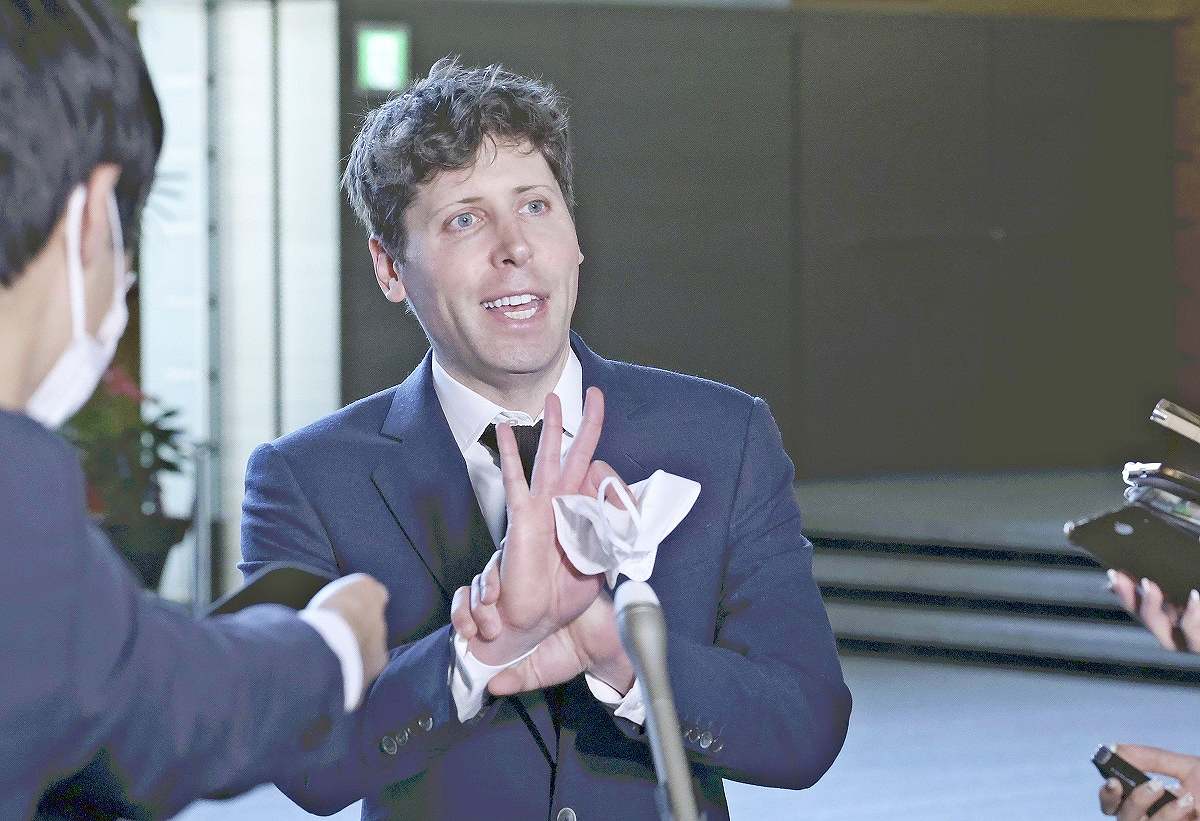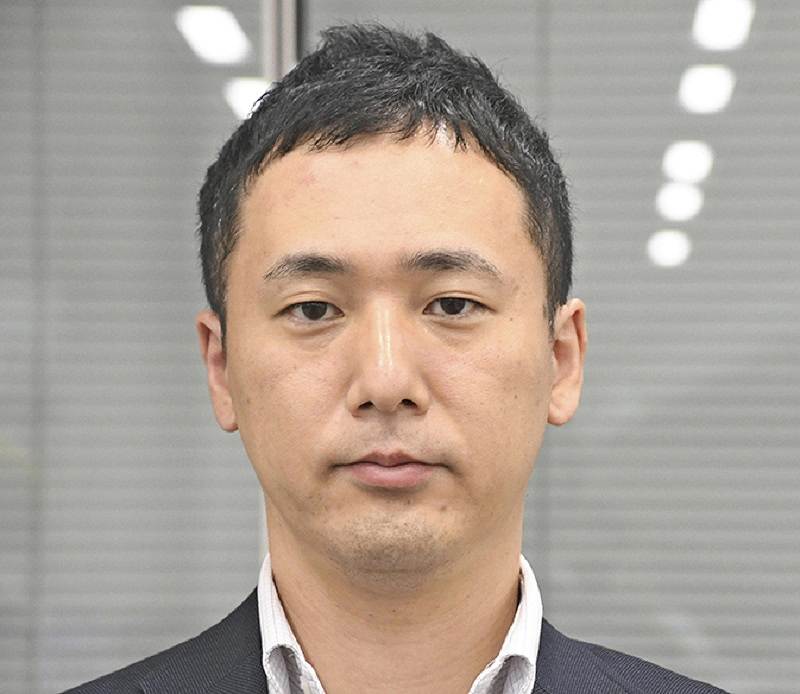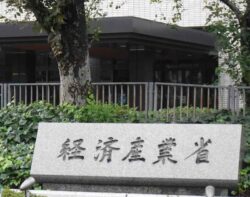
OpenAI Chief Executive Officer Sam Altman speaks to reporters after meeting with Prime Minister Fumio Kishida at the Prime Minister’s Office in April.
8:00 JST, May 13, 2023
When I was a child, the science fiction movie “Terminator 2” fascinated me. I was attracted by the story of two androids who traveled back in time from 2029 and fought over a boy who held the key to the survival of the human race. The androids were able to speak fluently like humans, but with the advent of ChatGPT, which is rapidly becoming popular in our society, I feel that such a story is no longer unrealistic.
ChatGPT is an interactive AI service developed by U.S. startup OpenAI and released free of charge in November 2022. When users enter questions or instructions online, it interacts and responds naturally, as if they were dealing with a human being. Within two months, the number of users exceeded 100 million.
As a test, I asked ChatGPT to write a poem on the theme of “summer,” and it promptly produced this poem.
“In the warmth of the sun’s embrace,
Summer arrives with leisurely pace.
The days are long, the nights are warm,
A season of delight, a season of charm.”
When I again asked ChatGPT to create a poem on the same theme, it began to write a different poem.
ChatGPT is not doing anything difficult. It simply predicts the most appropriate words to come next in a sentence and connects them one after another.
The AI used in ChatGPT has read a vast amount of books and news online and learned important words and the relationships between words in a sentence. As a result, it is able to pay attention not only to the word immediately before the next one, but also to words that are far away from it, making it much more capable of capturing context than conventional AI.
AI researcher Hitoshi Matsubara, a professor at the University of Tokyo, said: “ChatGPT does not have a proper understanding of grammar. However, the way the words are connected is astonishingly good. I didn’t expect AI with this level of accuracy to come out so soon.”
In Japan, a number of companies and entities in the business and government sectors are introducing ChatGPT to improve operational efficiency and productivity.
Tokio Marine & Nichido Fire Insurance Co. will begin a test operation in June of a system that uses ChatGPT to automatically generate draft responses to inquiries about insurance coverage and procedures.
The Agriculture, Forestry and Fisheries Ministry is considering using the system for some tasks, such as revising manuals for online services. The city government in Yokosuka, Kanagawa Prefecture, has begun a demonstration experiment to introduce ChatGPT for tasks such as creating and translating public relations literature.
However, there are many issues and concerns surrounding the use of ChatGPT. The biggest problem is that there are many cases in which it provides answers that contain errors.
For example, when it was asked about who the past prime ministers of Japan were, it listed several politicians who had never been prime minister. Nevertheless, since the answers are written in plausible Japanese, it is sometimes difficult to determine whether the answers are correct or not at a glance, which might lead to the spread of false information. Exposure of personal information and copyright infringement have also been pointed out.
Since reports and papers can be generated instantly for students by using ChatGPT, it has a significant impact on school education. Last month, The Japanese Society for Artificial Intelligence warned against the easy use of ChatGPT and other generative AI, stressing that it is highly useful but still a developing technology. It urged students to refrain from using it for learning and to develop their own thinking skills, saying that it should not be used simply to get answers.
On the other hand, ChatGPT showed us that the emergence of innovative technology can make it possible to turn the tables in the fierce competition in science and technology fields.
For more than a decade, it has been Google that has led the world in information science, not only in AI, but also in the development of quantum computers, which are expected to supply the next generation of computing power. But now, with the rapid spread of ChatGPT, the world’s attention has turned to OpenAI, and significant investment is pouring in. Google, feeling the threat of being ousted from its position as champion, is said to have declared a “Code Red” state of emergency within the company.
This indicates that the situation may be an opportunity for Japan, which has lagged behind the rest of the world in AI development. For example, several experts predict that combining generative AI and robotics could lead to new breakthroughs. Robot development is still one of the areas where Japan maintains an advantage in the world. Toshikazu Fukushima, a fellow at the Center for Research and Development Strategy of the Japan Science and Technology Agency, said: “Depending on how things are done, Japan has a chance to win. We need to calmly assess our chances of winning.”
In the space industry, the U.S. company SpaceX is leading the world with its unique technology of a reusable rocket system. Japan’s R&D capabilities are said to be stagnant, but there is no need to be pessimistic just yet. I hope that Japanese universities and companies will be ambitious and promote the development of their own original technologies.
Political Pulse appears every Saturday.

Sho Funakoshi
Funakoshi is a staff writer in the Science News Department of The Yomiuri Shimbun.
Top Articles in Editorial & Columns
-

Riku-Ryu Pair Wins Gold Medal: Their Strong Bond Leads to Major Comeback Victory
-

Reciprocal Tariffs Ruled Illegal: Judiciary Would Not Tolerate President’s High-Handed Approach
-

China Provoked Takaichi into Risky Move of Dissolving House of Representatives, But It’s a Gamble She Just Might Win
-

Flu Cases Surging Again: Infection Can Also Be Prevented by Humidifying Indoor Spaces
-

Japan’s Plan for Investment in U.S.: Aim for Mutual Development by Ensuring Profitability
JN ACCESS RANKING
-

Producer Behind Pop Group XG Arrested for Cocaine Possession
-

Japan PM Takaichi’s Cabinet Resigns en Masse
-

Man Infected with Measles Reportedly Dined at Restaurant in Tokyo Station
-

Israeli Ambassador to Japan Speaks about Japan’s Role in the Reconstruction of Gaza
-

Videos Plagiarized, Reposted with False Subtitles Claiming ‘Ryukyu Belongs to China’; Anti-China False Information Also Posted in Japan
























